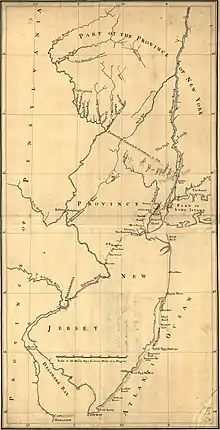Thomas Samuel Swartwout
Thomas Samuel "Maas" Swartwout (1660 – c. 1723) was one of the earliest settlers of the Delaware River Valley, early landowner of America, holder of the Pennpack (Minisink) Magheckemeck land patent, and a founder of Deerpark, Orange County, New York.[1][2] He married Elizabeth Jacobse Jansen Gardenier on February 4, 1683 in New York.
Thomas Samuel Swartwout | |
|---|---|
| Born | 1660 |
| Died | 1723 |
| Spouse |
Elizabeth Jacobse Jansen Gardenier
(m. 1683) |
Family
Thomas Swartwout was the eldest son of Roelof Swartwout and Eva Brandt de Hooges and grandson of Tomys Swartwout. He was the brother of Antoni Swartwout and Bernardus Swartwout, brother in law of Jacob Kip, and father of Jacobus Swartwout and grandfather of Brigadier General Jacobus Swartwout.[3][4] He was born in Beverwyck, New Netherland in 1660.

Early settler and founder in New York
On October 14, 1697, Swartwout, along with his brothers Antoni and Bernardus, were granted 1200 acres of patent land along with Pierre Guimard, Jacques Caudebec, Jan Tyse, and David Jamison, on Magheckemeck or Wagheckemeck, later called the Peenpack patent.[5][3] This is current day Deerpark, New York and Orange County, New York. These lands extended into present day New Jersey and the Delaware River and formed what is referred to as the Minisink Angle.
New York–New Jersey border establishment
Desiring to have verifiable evidence that their land lay within the bounds of the province of New York, Swartwout and his co-partners petitioned the General Assembly to take immediate action for the establishment of a boundary between New York and East Jersey. On November 1, 1700, the members of the House of Representatives collectively sent a petition to his Excellency Richard the Earl of Bellamont, governor of the province, setting "forth this request of the settlers in the Minnessinck" valley: "Whereas, some differences do arise between the county of Orange, within this province, and the province of East-New Jersey, [we] therefore humbly pray your excellency to take into your consideration the settling of the bounds between the province and the said province of East-New Jersey." The same indefinite knowledge regarding the position of the boundary line between Orange and Ulster counties existed. In order to define the situation of Maghaghkemeck and that of Great and Little Minisink, the General Assembly, in 1701, enacted that that part of Orange County should be annexed immediately to the county of Ulster until the bounds between the two counties should be settled, and that in the interval the freeholders of the three districts should cast their votes for representatives in the County of Ulster "as if they actually lived in the said county." The first boundary line separating the two counties extended across the territory of the present town of Deerpark not far south of the village of Huguenot to a point on "the northwardmost branch" of the Delaware River, near Sparrowbush. The boundary between the two provinces was surveyed and documented in 1769.

On the death of Swartwout, around the year 1723 in Machackemeck, New York, Samuel, his son, took charge of the family property. [6]
References
- "A history of Deerpark in Orange County, N.Y. : Gumaer, Peter E., 1771-1869 : Free Download & Streaming : Internet Archive". 2001-03-10. Retrieved 2014-02-03.
- "The Town of Deerpark, Orange County, New York > History". Townofdeerpark.org. Retrieved 2014-02-03.
- "Gumaer Cemetery / Pioneer Knoll Cemetery". Minisink Valley Historical Society.
- Hoeldke, Kathy A. (ed.). "The Updated Swartwout Chronicles and related families".
35.Thomas4 Swartwout (Roeloff3, Tomys2, Rolef1)
- Lewis, Brian J. (2002). Deerpark - Brian J. Lewis - Google Books. ISBN 9780738511078. Retrieved 2014-02-03.
- "The Swartwout chronicles, 1338-1899, and the Ketelhuyn chronicles, 1451-1899" (PDF). Retrieved 2014-02-03.